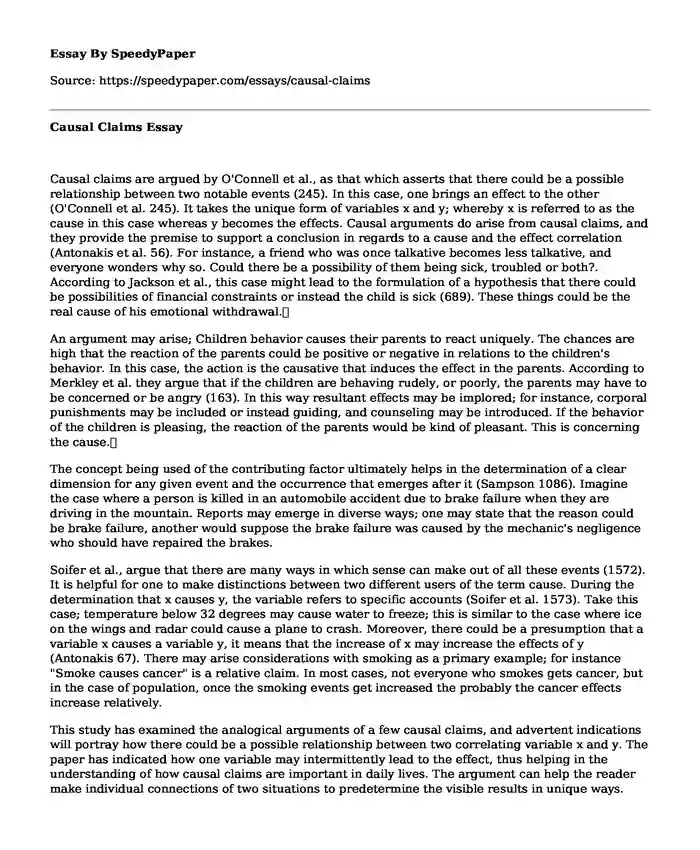
| Type of paper: | Essay |
| Categories: | History Human resources Research Personality |
| Pages: | 3 |
| Wordcount: | 727 words |
Causal claims are argued by O'Connell et al., as that which asserts that there could be a possible relationship between two notable events (245). In this case, one brings an effect to the other (O'Connell et al. 245). It takes the unique form of variables x and y; whereby x is referred to as the cause in this case whereas y becomes the effects. Causal arguments do arise from causal claims, and they provide the premise to support a conclusion in regards to a cause and the effect correlation (Antonakis et al. 56). For instance, a friend who was once talkative becomes less talkative, and everyone wonders why so. Could there be a possibility of them being sick, troubled or both?. According to Jackson et al., this case might lead to the formulation of a hypothesis that there could be possibilities of financial constraints or instead the child is sick (689). These things could be the real cause of his emotional withdrawal.
An argument may arise; Children behavior causes their parents to react uniquely. The chances are high that the reaction of the parents could be positive or negative in relations to the children's behavior. In this case, the action is the causative that induces the effect in the parents. According to Merkley et al. they argue that if the children are behaving rudely, or poorly, the parents may have to be concerned or be angry (163). In this way resultant effects may be implored; for instance, corporal punishments may be included or instead guiding, and counseling may be introduced. If the behavior of the children is pleasing, the reaction of the parents would be kind of pleasant. This is concerning the cause.
The concept being used of the contributing factor ultimately helps in the determination of a clear dimension for any given event and the occurrence that emerges after it (Sampson 1086). Imagine the case where a person is killed in an automobile accident due to brake failure when they are driving in the mountain. Reports may emerge in diverse ways; one may state that the reason could be brake failure, another would suppose the brake failure was caused by the mechanic's negligence who should have repaired the brakes.
Soifer et al., argue that there are many ways in which sense can make out of all these events (1572). It is helpful for one to make distinctions between two different users of the term cause. During the determination that x causes y, the variable refers to specific accounts (Soifer et al. 1573). Take this case; temperature below 32 degrees may cause water to freeze; this is similar to the case where ice on the wings and radar could cause a plane to crash. Moreover, there could be a presumption that a variable x causes a variable y, it means that the increase of x may increase the effects of y (Antonakis 67). There may arise considerations with smoking as a primary example; for instance "Smoke causes cancer" is a relative claim. In most cases, not everyone who smokes gets cancer, but in the case of population, once the smoking events get increased the probably the cancer effects increase relatively.
This study has examined the analogical arguments of a few causal claims, and advertent indications will portray how there could be a possible relationship between two correlating variable x and y. The paper has indicated how one variable may intermittently lead to the effect, thus helping in the understanding of how causal claims are important in daily lives. The argument can help the reader make individual connections of two situations to predetermine the visible results in unique ways.
Works CitedAntonakis, John, et al. "On making causal claims: A review and recommendations." The leadership quarterly 21.6: 56-63
Jackson, Patrick Thaddeus. "Causal claims and causal explanation in international studies." Journal of International Relations and Development 20.4 (2017): 689-716.
Merkley, Rebecca, Anna A. Matejko, and Daniel Ansari. "Strong causal claims require strong evidence: A commentary on Wang and colleagues." Journal of Experimental Child Psychology 153 (2017): 163-167.
O'Connell, Ann A., and DeLeon L. Gray. "Cause and event: Supporting causal claims through logistic models." Educational Psychology Review 23.2 (2011): 245.
Sampson, Robert J., Christopher Winship, and Carly Knight. "Translating causal claims: Principles and strategies for policy-relevant criminology." Criminology & Pub. Poly 12 (2013): 587. (2010): 1086-1120.
Soifer, Hillel David. "The causal logic of critical junctures." Comparative political studies 45.12 (2012): 1572-1597.
Cite this page
Causal Claims. (2022, Dec 15). Retrieved from https://speedypaper.com/essays/causal-claims
Request Removal
If you are the original author of this essay and no longer wish to have it published on the SpeedyPaper website, please click below to request its removal:
- Holocaust Essay Sample
- Essay Example on American History
- Essay Sample Comprising the Responses to the Posts on News Articles
- Cultural Assessment Essay Sample: Ingvar Kamprad Elmtaryd Agunnaryd Company
- Free Essay with an Article Summary about Project GLOBE
- The Virginia Plan and Other Prominent Documents, Free Essay in American History
- 5.3 Wellhead Equipment
Popular categories




